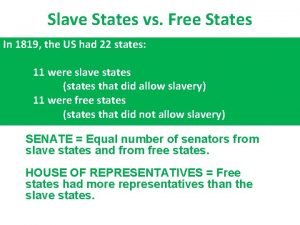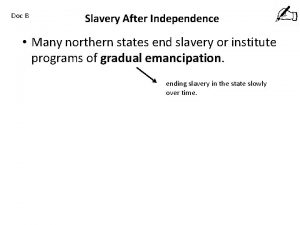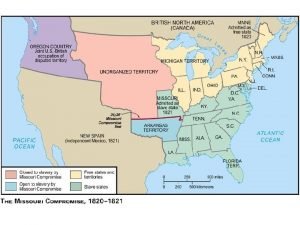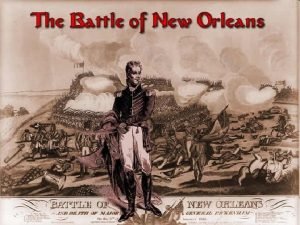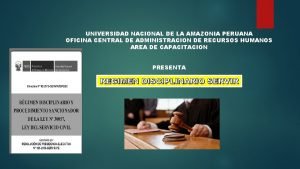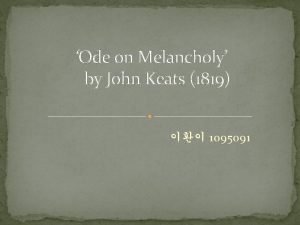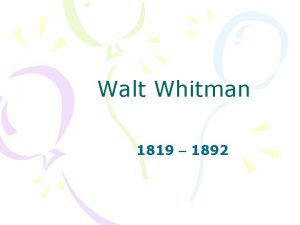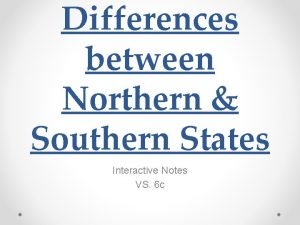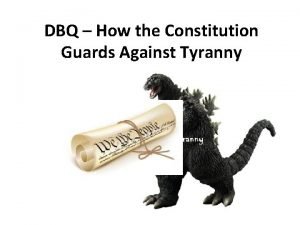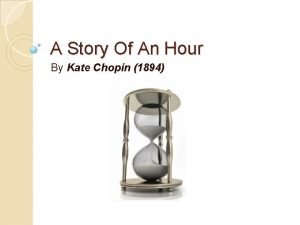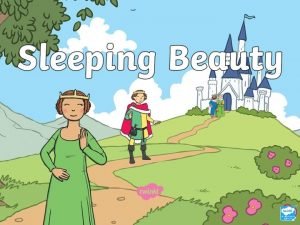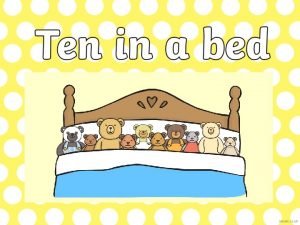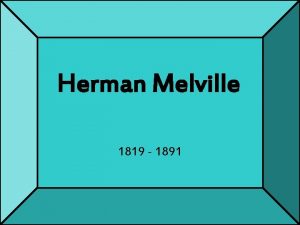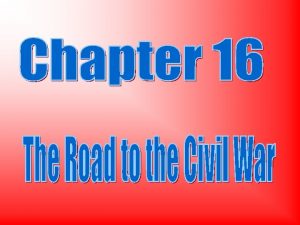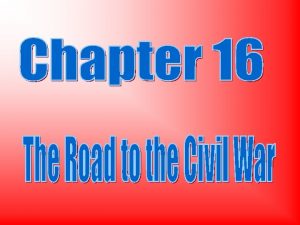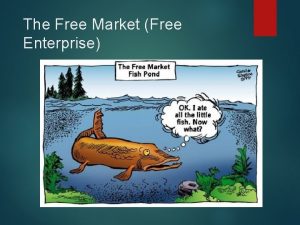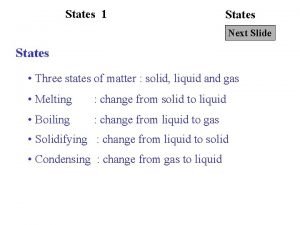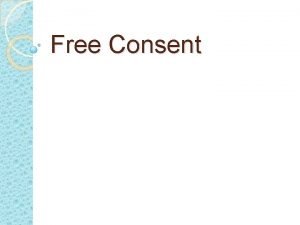In 1819 there were 11 free states and




























- Slides: 28




• In 1819, there were 11 free states and 11 slave states. Representation in the Senate was evenly balanced between the North and the South. • Missouri wanted to join the Union as a slave state. That would give the South a majority in the Senate.

Missouri Compromise Henry Clay proposed the Missouri Compromise. • Missouri would join the Union as a slave state. • Maine would join the Union as a free state.

Missouri Compromise • Congress drew an imaginary line across the southern border of Missouri at latitude 36º 30´N. Slavery would be permitted in the Louisiana Purchase south of that line.

Issue of Slavery in the West Problem: • Result of the Mexican War, US acquired a vast amount of land. • Missouri Compromise applied only to the LA Purchase, not the

Arguments - Issue of Slavery in the West North: Congressman David Wilmot (PA) called for a law to ban slavery in any territories won from Mexico. (Wilmot Proviso)

Arguments - Issue of Slavery in the West South: Southern leaders said Congress had no right to ban slavery in the West

The Outcome • House passed the Wilmot Proviso, but the Senate defeated it. The argument continued.

Opposing Views • Abolitionists - Slavery should be banned throughout country & morally wrong. • Southern Slaveholders Slavery should be allowed in any territory. Slaves who escape to the North should be returned.

Other Viewpoint • Idea of Popular Sovereignty right of people to create their government • Voters in a new territory would decide for themselves whether or not to allow slavery.

A New Political Party • Many northern Democrats & Whigs opposed the spread of slavery, but leaders of both parties refused to take a stand. • Antislavery members of both parties met and founded Free. Soil Party

Free-Soil Party - main goal was to keep slavery from spreading to the western territories.

Presidential Election of 1848 issue in election- slavery • Free-Soilers – Van Buren: ban on slavery in land gained from Mexican War • Democrats - Cass (Michigan): supported popular sovereignty • Whigs – Taylor- LA slave owner

• Winner of 1848 Presidential Election. Taylor • Even Congress contained 13 Free-Soilers

Slavery Debate…. . • 1849 - 15 slave states and 15 free states. • California enter as a free state - North would have a majority in the Senate. South fear territories Oregon, Utah, and New Mexico enter as free states

• Southerners worried would be outvoted in Senate • Southern States possibility secede or leave the US

Opposing Views • Clay - North and South reach an agreement and if they failed to do so - warned that the nation could break apart. • Calhoun - Refused to compromise insisted that slavery be allowed in the western territories

Calhoun Continued… • demanded fugitive slaves be returned to their owners, and warned if the North did not agree South would use force to leave the Union • Webster - slavery evil but the breakup of US worse - warned against civil war

Compromise of 1850 • Admits CA as a free state • Territories of New Mexico & Utah voters decide slavery question by popular sovereignty • Bans slave trade in Washington, DC (not slavery) • Fugitive Slave Act

Compromise Continued… • Settles Texas/New Mexico border dispute - (Texas gave up land in eastern New Mexico and in return US assumed payment of their debts)

Fugitive Slave Act of 1850 • All citizens must help catch runaway slaves. • People who let fugitives escape could be fined $1, 000 and jailed. • Special courts handle cases of runaways. There would be no jury trials. Judges receive $10 for sending an accused runaway to the South and $5 for setting

Response - Fugitive Slave Act • Some judges sent African Americans to the South whether or not they were runaways to receive extra money. • Act enraged antislavery northerners - made them feel as if they were part of the slave system.

Uncle Tom’s Cabin • Written by Harriet Beecher Stowe to show evils of slavery and the injustice of Fugitive Slave Act. • Book tells the story of Uncle Tom, an enslaved African American noted for his kindness. • Tom is bought by the brutal Simon Legree

Uncle Tom’s Cabin Continued. . • When Tom refuses to reveal the location of two runaways, Legree whips him to death.

Reaction to Uncle Tom’s Cabin • Northerners could no longer view slavery as a political problem for Congress to settle. More and more northerners now saw slavery as a moral problem facing every American.

Reaction to Uncle Tom’s Cabin • Southerners claimed that the book did not give a true picture of a slave’s life.
 How many slave states were there in 1819
How many slave states were there in 1819 What states had slavery
What states had slavery 11 free states
11 free states There was there were ile ilgili cümleler
There was there were ile ilgili cümleler England in 1819
England in 1819 Informe técnico 1005-2018-servir-gpgsc
Informe técnico 1005-2018-servir-gpgsc Resssucitar
Resssucitar Singapore before 1819
Singapore before 1819 John keats 1819
John keats 1819 In 1816 took a little trip
In 1816 took a little trip John william polidori
John william polidori Informe técnico 430-2017-servir-gpgsc
Informe técnico 430-2017-servir-gpgsc She dwells with beauty beauty that must die
She dwells with beauty beauty that must die Walt whitman born in new york in 1819
Walt whitman born in new york in 1819 Carlsbad decrees summary
Carlsbad decrees summary Southern states
Southern states Big states vs small states guard against tyranny
Big states vs small states guard against tyranny Future in the past was were going to examples
Future in the past was were going to examples Helmholtz free energy
Helmholtz free energy Plot story of an hour
Plot story of an hour Optimistic poem
Optimistic poem And then there were none mystery elements
And then there were none mystery elements Literary analysis of and then there were none
Literary analysis of and then there were none And then there were none introduction
And then there were none introduction There were ninety and nine
There were ninety and nine Once upon a time king
Once upon a time king Foreshadowing in and then there were none
Foreshadowing in and then there were none 3 in the bed and the little one said
3 in the bed and the little one said Chapter 11 and then there were none
Chapter 11 and then there were none
